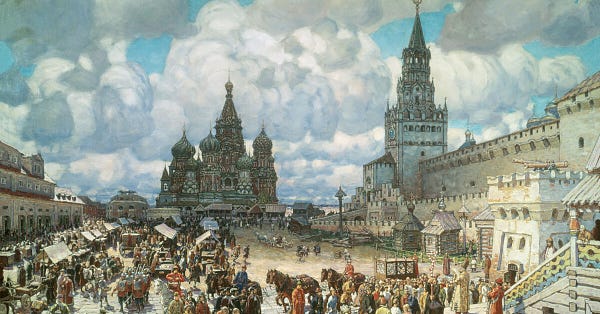Greetings from the Tyrolean Alps, where I’ve been living the glamorous life of a figure-skating dad this week. (No soccer moms in this family, alas.) It’s a respite, to a degree, from the twin madnesses that are Washington and London—even if Washington and London, through the magic of Zoom (and the horror of Teams) are never too far away. But in truth, it’s not the technology that impinges on the idyll, or even the fact that I wasn’t smart enough to take the week off work: it’s that none of it feels real. Nearly ten months into this war, the war itself feels more real than the mountains surrounding me.
That, of course, is as it should be. The true problem will be when that sense of reality begins to fade.
What I’m thinking about
The parts of the Internet that I tend to inhabit were captured earlier this week by discussion of a piece by Dmitri Trenin, in which he describes — for Russian readers, not Western ones — what the future looks like. This is a future, Dmitri writes, in which Russia has no choice but to win in Ukraine, and having won in Ukraine, to continue its struggle against a West that will never accept it; a future in which Russia can and should become more aggressive towards its former satellites; and a future in which Russia can and should embrace its rogue status.
Full disclosure: I used to work with Dmitri at the Carnegie Moscow Center from 2005-2011, including four years when he was director and I was his deputy. While I have no patience for the political and analytical positions he has taken of late, I struggle to translate that into antipathy for the man, but I will admit feeling a sense of betrayal. He could have fought for the cooperation and understanding that the Carnegie Moscow Center stood for; that he did not is hard for me to swallow. And so I’ll let others unpack the content and core implications of his analysis.




All of that said, Dmitri’s article contains a core truth, which it is important for Russians—including powerful Russians—to hear and understand. He writes:
There is no way back. To be fair, there is in theory a road to capitulation, but even that would not return Russia to the 20th of February, or even to 2013. That would be a route to national catastrophe, to the likelihood of chaos and the unconditional loss of sovereignty. If we want not only to avoid that kind of scenario, but to arrive at a qualitatively better level of interaction with the outside world, then our common direction of motion can only be forward. The immutable condition of success is the resolution of the Ukraine problem.
I’ll leave aside the fact that Dmitri is arguing for a course of action that can only bring more destruction and impoverishment to Russia, not to mention to Ukraine itself. The reality is that most Russians have not acknowledged what he is laying bare: that Russia’s war against Ukraine has, as he writes, led to a fundamental break between the West and Russia, eviscerating any genuine Western constituency for cooperation with Russia and mobilizing Western states and societies to ensure that Russia’s ability to threaten its neighbors is removed. It is high time that Russians—including ordinary Russians, but particularly those in positions of relative power and privilege—hear what Dmitri is saying.
Rumors of impending regime splits are as old as this war and, indeed, many years older. Throughout it all, I’ve seen precious little that would pass for solid emphasis. But among those who claim knowledge of elite conversations in Moscow, the general thrust seems to be that there are fundamental disagreements about what to do when this war is lost: to dig in for confrontation with the west, or to pivot away from Putin’s catastrophic policies and seek a more lucrative future. If Dmitri is right, if Russia will be a rogue state regardless of what happens next, Moscow elites are fracturing over a fiction.
But hearing what Dmitri is saying and believing it are two different things—and that’s what has me intrigued. Many in the Russian elite may not believe in the future Dmitri paints because they don’t want to believe in it. It’s a future diametrically opposed to the one they thought they had been building, a future in which they struggle to imagine themselves. If the view Dmitri propounds is becoming more widespread, or at least more widely discussed, it is likely to provoke a range of responses. Some in the elite will decide this future is one of which they cannot be a part, and they will seek an individual way out. Others, including those who cannot find a way out, will accommodate themselves to this new vision, perhaps believing that, even if their lives are diminished, their relative position will still leave them nearer the top of the Russian food chain than the bottom. Some number of people, however, will reject the premise entirely, and that’s where the real split will be: between elites who believe in the inevitability of catastrophe, and those who believe it is worth mobilizing to avoid it.
What I’m reading
I don’t know, of course, whether Dmitri Trenin is right when it comes to the future for Russia—whether, in fact, the West will continue to isolate Russia regardless of the outcome of the war and the future of its politics. Two texts this week did, however, provide some useful context for thinking about that question.
The first was a paper published Wednesday by the European Council on Foreign Relations and written by Kadri Liik, one of most level-headed and clear-thinking Russia hands you’ll find anywhere in the world. In her audit of the state of EU-Russia relations, Kadri finds plenty of evidence of what we already know, namely that European states and societies are broadly consolidated in their conviction that Russia most lose this war and Ukraine and the West must win. Her finding that no one has a clear idea what victory might look like or how it might be achieved is also not exactly news.
But for my money at least, the key element in Kadri’s paper is her conclusion that the pre-war relationship with Russia has been irretrievably demolished, and that there is no available vision of a productive, stable and cooperative relationship to replace it. In this much, at least, Kadri’s analysis overlaps with Dmitri’s. But Kadri’s research also reveals an unease with this state of affairs, a sense that just as cooperation with Russia is unimaginable, so too is perpetual conflict with Russia undesired. The future that Dmitri paints as inevitable is thus not a future that Europe seems to want.
The second piece of context was an investigation published Tuesday by a team of journalists at Reuters into the supply chains that Russia is using to evade sanctions and access the Western technology it needs to sustain its war effort. Often originating in Europe and running through Turkey, Hong Kong and other jurisdictions, these networks have kept European- and American-made chips and other technology flowing into Russia.
While Reuters and their collaborators at the Royal United Services Institute concentrate on the impact this sanctions-busting activity is having on war fighting—including evidence of some of these chips turning up in the debris of Russian rocket attacks on Ukraine—my concern is a bit broader than that. Russia’s ability to maintain and exploit these networks sends a signal to those in the system who might be wondering how far they can accommodate themselves to the diminished future Dmitri predicts that things may, in fact, be not only manageable, but profitable. That’s a dangerous message to send.
Two important pieces of academic research made it to my desktop this week as well, although one of them isn’t quite hot off the presses. The older one is an article in Social Media + Society from September, by the Oxford-based Belarusian social-media researcher Aliaksandr Herasimenka. Bucking the trend of recent years that has seen the digital world as a tool more for autocrats than for democrats, Aliaksandr shows how the use of messaging platforms in Belarus and Russia has allowed opposition movements to evade repression by creating a dispersed and camouflaged leadership structure. In a nutshell, the use of such platforms allows the movement both to speak as a persona in and of itself, and to draw on a multiplicity of human personalities, adding to its resilience and its reach. Astute readers will note, of course, that Moscow and Minsk have nonetheless successfully repressed their respective opposition movements—but the fact remains that they have not fundamentally undermined the ability of those movements to communicate.
The newer one is a working paper published by the University of Exeter sociologist Alexey Bessudnov, who did the research to uncover the truth behind the widespread observation that ethnic minorities in Russia were bearing a disproportionate burden of the country’s war in Ukraine. Alexey found that some, though not all, ethnic minorities are indeed over-represented among the casualty figures. Digging deeper, though, he finds that the phenomenon has less to do with ethnicity itself, and more to do with the socio-economic deprivation that often drives young men into the military as a means of social mobility. This is, of course, something that many of us have long suspected to be true—but tremendous kudos to Alexey for actually proving it.
What I’m listening to
I discovered Porridge Radio only recently, thanks to a review of their 2022 album (and their third effort), “Waterslide, Diving Board, Ladder to the Sky”. There is an unreasonable earnestness to their sound, and not just to the lyrics—an urgency to the craft and the performance and Dana Margolin’s voice that drew me in and hasn’t let me go. Have a listen, if you haven’t before.




2 things
1) My greatfull thanks to you personally for the deep insights you chronicle regarding Russia’s global political interactions. It is at a level that my main news providers (Guardian + NYT + The Times + Podcasts (BBC / Telegraph) + Twitter) never seem to get near.
2) New substack subscribers need to hear 1) but make their own minds up. Browsing Professor Greene’s KCL staff page is a good start to establish his impressive pedigree: https://www.kcl.ac.uk/people/samuel-greene
Dear Sam, thank you for this fascinating roundup.
Trenin's text is a heartbreaker (on so many levels).
I am thankful, in particular, thankful for the academic papers you referred.
Both a treat.